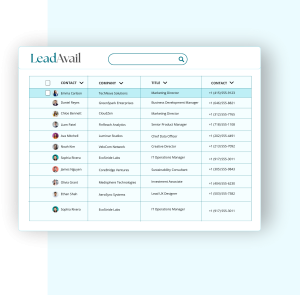Your Customer Relationship Management (CRM) system should be your sales team’s most powerful asset. But what if it’s secretly sabotaging your efforts? You might not realize it, but bad data could be quietly choking your sales performance. “Dirty CRM data” refers to the inaccuracies lurking within your database: outdated contact information, missing crucial fields, duplicate entries, invalid email addresses, and more. It’s the digital equivalent of trying to navigate with a torn, outdated map.
Think about it: your CRM is the central hub for all customer interactions, lead information, and sales activities. If that information is flawed, every subsequent action from email campaigns to sales calls is built on a shaky foundation. This isn’t just an administrative headache; it’s a direct threat to your revenue and growth.

The Warning Signs of Dirty CRM Data
How can you tell if your CRM data is more of a hindrance than a help? Look out for these red flags:
- High bounce rates in email campaigns: Are your carefully crafted emails bouncing back in droves? This is a classic sign of outdated or invalid email addresses.
- Low response or engagement from outreach: If your prospects aren’t responding, it might not be your messaging. You could be targeting the wrong people, or your information about them could be completely off.
- Sales reps wasting time on bad leads: Imagine your team spending precious hours chasing contacts who have left the company, or dialing disconnected numbers. This is a direct drain on productivity.
- Inaccurate reporting and forecasting: If your data is unreliable, your sales reports and future forecasts will be too. This makes strategic planning incredibly difficult and can lead to poor business decisions.
The Real Cost of Bad CRM Data
The consequences of dirty data extend far beyond mere frustration. They hit your bottom line directly:
- Lost revenue from missed opportunities: Every incorrect contact detail or missed follow-up due to bad data is a potential sale slipping through your fingers.
- Wasted ad spend and email credits: Pouring money into marketing campaigns that target non-existent or irrelevant contacts is like throwing cash into the wind.
- Reduced team productivity: When your sales team spends more time verifying data and dealing with errors than actually selling, their efficiency plummets.
- Damaged brand reputation: Sending emails to the wrong people, addressing contacts by incorrect names, or targeting companies with irrelevant offers can make your brand look unprofessional and out of touch.
Why CRM Data Gets Dirty (Faster Than You Think)
Data decay is a natural, ongoing process. Here’s why your CRM can become a mess surprisingly quickly:
- Job changes (especially in B2B industries): People change roles, get promotions, or move to new companies. Their contact details and responsibilities change with them. Studies show B2B data can decay at a rate of 20-30% per year.
- Incomplete form fills: Prospects often provide minimal information on web forms, leaving critical fields blank.
- Manual data entry errors: Typos, misspellings, and inconsistent formatting are inevitable when data is entered by hand.
- Lack of regular maintenance: Without a proactive approach to cleaning and updating, data inaccuracies accumulate over time like dust bunnies under a sofa.
How to Fix It (Without Burning Out Your Team)
Cleaning up your CRM might seem like a monumental task, but it’s essential. Here are practical steps to take:
- Run regular CRM audits: Schedule periodic deep dives to identify inconsistencies, duplicates, and outdated information.
- Standardize data fields: Establish clear, consistent rules for entries like job titles (e.g., “VP Sales” vs. “Vice President of Sales”), industries, and company names.
- Remove duplicates and inactive contacts: Regularly merge duplicate records and archive or delete contacts who haven’t engaged in a long time or whose information is clearly invalid.
- Enrich missing data: Use tools or services to fill in the blanks for critical information like correct email addresses, phone numbers, LinkedIn URLs, and firmographic details.
Let a Specialist Handle It for You
If the thought of tackling this internally feels overwhelming, or if your team is already stretched thin, there’s a more efficient solution.
“At Leadavail, we specialize in CRM Data Cleanup, Enrichment, and Ongoing Data Health Management so your sales team can focus on closing, not cleaning.”
We provide a comprehensive suite of services to ensure your CRM data is accurate, complete, and actionable:
- CRM audits and cleanup: We’ll diagnose the health of your data and perform a thorough cleanup.
- Data enrichment: We enhance your existing records with vital information, including verified emails, direct-dial phone numbers, LinkedIn profiles, and detailed firmographics.
- Ongoing data hygiene support: We help you implement processes and provide support to keep your CRM data pristine over the long term.
Final Thoughts
A clean, well-maintained CRM is the backbone of a high-performing sales operation. The benefits are clear: a faster pipeline, better conversion rates, and a stronger ROI on all your sales and marketing efforts. Don’t let dirty data continue to undermine your success.
Ready to clean up your CRM and give your sales a fresh start? Leadavail to get started
